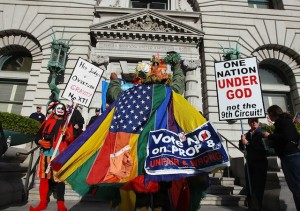Proposition 8: Nation Waits on U.S. Supreme Court’s Decision to Review Same-Sex Marriage Cases
 The decision to overturn a California proposition that bans same-sex marriages may finally come to the United State’s Supreme Court’s attention. On November 30th, 2012, the Supreme Court justices met to discuss which cases the court will review (that is, whether to “grant certiorari”). Perry v. Brown (formerly known as Perry v. Schwarzenegger) was among the many cases considered. Although the Supreme Court have yet to come to a conclusion about reviewing the case, the nation anticipates that a decision may come as late as December 7th, 2012.
The decision to overturn a California proposition that bans same-sex marriages may finally come to the United State’s Supreme Court’s attention. On November 30th, 2012, the Supreme Court justices met to discuss which cases the court will review (that is, whether to “grant certiorari”). Perry v. Brown (formerly known as Perry v. Schwarzenegger) was among the many cases considered. Although the Supreme Court have yet to come to a conclusion about reviewing the case, the nation anticipates that a decision may come as late as December 7th, 2012.
Significance of Granting Certiorari
The Supreme Court’s decision to consider granting certiorari on cases like Perry v. Brown came after decades of litigation. Should the Supreme Court grant certiorari, the United States may receive its first landmark decision about the United States Constitution and the government’s–whether state or federal–power to ban/grant same-sex marriages.
Why is this important? Other than the ability to marry and be married, marriage rights ultimately affect various types of benefits, such as eligibility for Supplemental Security Income, Medicaid, some property tax deductions, income tax reductions, and other federal and state benefits. One’s marital status also affects immigration. In the past, federal immigration courts did not recognize same-sex marriages, and a partner would not be protected from deportation even if he/she married a United States citizen prior to the expiration of his/her immigration documents. Among a myriad of other issues, marital status ultimately affects rights at separation. State courts are not likely to provide alimony (or spousal support) to non-married couples who were cohabiting. State partition actions are also complicated when separated non-married couples bicker over “who gets to keep what property.”
In our firm, we see marital statuses also affecting business partnerships and assets, particularly in the event of a divorce. In Florida, business property can become “marital property” subject to equitable distribution if any of the statutory conditions exist. Additionally, when it comes to criminal defense, a defendant’s marital status can also affect who can testify against the defendant and whether that testimony is permissible at trial. Spousal privilege means that a witness can be immune from having to testify against a spouse, with regard to certain issues.
Background on Proposition 8
The plaintiffs in Brown consisted of the City of San Francisco and two same sex couples who were denied marriage licenses by the clerks of Los Angeles County and Alameda County. The denial to issue same-sex marriage licenses came by way of California ballot Proposition 8. Passed by voting results of 52.4% in November 2008, Proposition 8 amended the California State Constitution, thus providing that “only marriage between a man and a woman is valid or recognized in California.”
The Proponents of Proposition 8 argued that Proposition 8 preserved the traditional definition of marriage, and that “it is not an attack on the gay lifestyle.” Specifically, the argument is that Proposition 8 does not take away any rights or benefits of homosexual domestic partnerships because under California Law,“’domestic partners shall have the same rights, protections, and benefits’ as married spouses.” The ballot argument for Proposition 8 also indicated the concern that public school teachers would be required to teach children that there is no difference between gay and heterosexual marriage. The Proponents argued that this is “an issue for parents to discuss with their children according to their own values and beliefs.” The arguments addressed in the Brown case were first heard in the Northern District Court of California, where it was decided that Proposition 8 did not advance any rational basis in singling out homosexual men and women in denying marriage licenses. The District Court’s decision was later appealed to the Ninth Circuit Court of Appeals where Proposition 8 was again determined to be unconstitutional. The Ninth Circuit, citing opinions of the lower courts, held that California citizens have a fundamental right to marry under the California Constitution, and that similar bans on issuing marriage licenses to same-sex couples was a violation of California’s equal protection clause and due process. On July 30, 2012, Proponents of Proposition 8 submitted the case to the United States Supreme Court for review.
Contact us today, and find out how a marital status may affect business, civil and criminal litigation!
Article by: Florence Chen
Leave a Reply